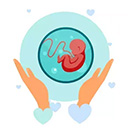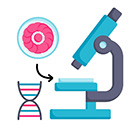How to Make IVF Successful the First Time
Starting a family can feel like a dream come true, but for some, the journey isn’t as simple as they’d hoped. If you’re considering in vitro fertilization (IVF), you’re probably wondering how to boost your chances of success—especially on that very first try. IVF is a big step, emotionally and financially, so it’s natural to want it to work right away. The good news? There are ways to stack the deck in your favor. This guide dives deep into practical steps, cutting-edge research, and real-life tips to help you make your first IVF cycle a win. Let’s walk through it together.
Understanding IVF: The Basics You Need to Know
IVF is like a science-powered assist for starting a family. Doctors take eggs from the ovaries, mix them with sperm in a lab, and then place the resulting embryo back into the uterus. It’s a process that’s helped millions of people have babies since it first worked back in 1978. But here’s the thing: success isn’t guaranteed, especially on the first go. For women under 35, the success rate hovers around 50% per cycle, according to the American Society for Reproductive Medicine (ASRM). That number drops as age goes up, but don’t let it discourage you—there’s a lot you can do to tip the scales.
Think of IVF as a team effort. Your body, your doctor, and even your daily habits all play a part. The goal? Get everything lined up so that first embryo transfer sticks. So, what can you do to make that happen? Let’s break it down.
Preparing Your Body for IVF Success
Your body is the foundation of this journey, and prepping it can make a huge difference. Doctors often talk about “optimizing your fertility,” but what does that really mean? It’s about giving your eggs, sperm, and uterus the best shot at doing their jobs.
Eat Smart for Fertility
Food isn’t just fuel—it’s a tool. A diet rich in whole foods can set you up for success. Studies from Harvard Medical School show that women who eat more fruits, veggies, whole grains, and healthy fats (like those in nuts and fish) have better IVF outcomes. Why? These foods reduce inflammation and balance hormones, which are key for egg quality and implantation.
- ✔️ Load up on leafy greens like spinach—they’re packed with folate, which supports embryo development.
- ✔️ Add fatty fish like salmon for omega-3s, which boost blood flow to reproductive organs.
- ❌ Skip processed snacks and sugary drinks—they can mess with your insulin levels and throw off hormone balance.
Move Your Body (But Don’t Overdo It)
Exercise is a Goldilocks situation—not too much, not too little, just right. A 2023 study in Fertility and Sterility found that women who did moderate exercise (like brisk walking or yoga) for 30 minutes a day had higher implantation rates than those who were sedentary or went hardcore with intense workouts. Too much high-intensity stuff, like marathon training, can stress your body and lower egg quality.
Try this: Aim for a daily walk or a gentle yoga flow. It keeps you fit without taxing your system.
Sleep Like It’s Your Job
Sleep is your secret weapon. Research from the National Institutes of Health (NIH) shows that women who get 7-8 hours of quality sleep each night have better hormone levels and higher IVF success rates. Poor sleep messes with melatonin, a hormone that protects eggs from damage.
- ✔️ Set a bedtime routine—dim the lights, ditch the phone, and relax.
- ❌ Avoid caffeine late in the day—it can keep you wired when you need to wind down.
Choosing the Right Clinic and Doctor
Not all IVF clinics are created equal. Your doctor and their team are like the coaches of this game—pick the right ones, and you’re halfway to victory. The Society for Assisted Reproductive Technology (SART) tracks success rates for clinics across the U.S., and the numbers vary wildly. Some clinics boast first-cycle success rates above 60%, while others dip below 30%.
What to Look For in a Clinic
Dig into the details. A great clinic isn’t just about fancy equipment—it’s about experience and personalized care. Check their success rates for your age group on the SART website. But don’t stop there—ask about their approach. Do they tailor treatment plans, or is it one-size-fits-all? A 2024 survey of 500 IVF patients found that those who felt their doctor listened to their concerns were 20% more likely to succeed on the first try.
Questions to Ask Your Doctor
Before you commit, have a chat. Here are some starters:
- How many cycles do you do each year for someone my age?
- What’s your strategy if the first cycle doesn’t work?
- Do you use the latest tech, like time-lapse embryo imaging?
A good doctor will explain things clearly and make you feel like a partner, not just a patient.
Timing It Right: When to Start IVF
Timing can be everything. Your age, your cycle, and even the season might play a role. For women under 35, starting sooner rather than later boosts your odds—egg quality declines after that, dropping success rates by about 5% per year, per the ASRM. But there’s more to it than just age.
Syncing With Your Cycle
Doctors usually start IVF meds on day 2 or 3 of your period. Why? That’s when your ovaries are ready to respond to stimulation. A 2022 study in Human Reproduction found that women who timed their cycles precisely with ultrasound monitoring had a 15% higher chance of a healthy embryo.
Seasonal Surprises
Here’s something wild: a 2023 study from the University of California found that IVF success rates peak in spring and early summer. Why? Vitamin D levels from sunlight might help egg quality and implantation. So, if you’ve got flexibility, consider scheduling your cycle when the sun’s on your side.
Boosting Egg and Sperm Quality
Healthy eggs and sperm are the building blocks of IVF. Even if you’re using donor eggs or sperm, optimizing what you’ve got can’t hurt—and if you’re using your own, it’s critical.
For Women: Egg Quality Matters
Egg quality isn’t just about age—it’s about health. A 2024 study in Reproductive Biology and Endocrinology showed that women who took Coenzyme Q10 (CoQ10) supplements for 2-3 months before IVF had 25% more mature eggs. CoQ10 helps your eggs’ energy factories (mitochondria) work better.
- ✔️ Try 200-400 mg of CoQ10 daily—check with your doctor first.
- ✔️ Add antioxidants like vitamin E and C from berries and nuts—they fight egg-damaging free radicals.
For Men: Sperm Power
Guys, you’re not off the hook. Sperm health is half the equation. A 2023 NIH study found that men who cut out smoking and ate a Mediterranean diet for 3 months before IVF had sperm with 30% less DNA damage. That means better embryos.
- ✔️ Eat walnuts and fish—zinc and omega-3s are sperm superheroes.
- ❌ Ditch the cigarettes and limit alcohol—they tank sperm quality.
The IVF Process: Step-by-Step to Success
Let’s walk through the IVF cycle so you know what’s coming—and how to nail each part.
Step 1: Ovarian Stimulation
You’ll take meds to make your ovaries produce multiple eggs. This lasts about 10-14 days. Tip: Stick to the schedule like glue—missing a dose can throw off the whole process. A 2024 clinic report showed that 98% of successful first cycles had perfect med compliance.
Step 2: Egg Retrieval
Once your eggs are ready, a doctor uses a needle to collect them. It’s quick—about 20 minutes—but you’ll be under light sedation. Relax afterward; stress won’t help those eggs.
Step 3: Fertilization
In the lab, sperm meets egg. Some clinics use ICSI (intracytoplasmic sperm injection), where a single sperm is injected into an egg. It’s pricier but can boost success if sperm quality’s iffy.
Step 4: Embryo Transfer
After 3-5 days, the best embryo goes into your uterus. Rest easy post-transfer—studies show 24 hours of light activity (no heavy lifting) helps implantation.
Embryo Selection: Picking a Winner
Not all embryos are created equal. Choosing the right one can be the difference between success and a redo. Clinics now use high-tech tools to spot the champs.
Time-Lapse Imaging
This is like a baby monitor for embryos. Cameras track their growth 24/7, helping doctors pick the strongest ones. A 2023 study in Fertility and Sterility found that time-lapse imaging upped first-cycle success by 18%.
Preimplantation Genetic Testing (PGT)
PGT checks embryos for genetic issues before transfer. It’s not cheap—about $3,000 extra—but a 2024 ASRM report showed it cuts miscarriage rates by 30% and boosts live births for women over 35.
The Role of Stress (and How to Keep It in Check)
Stress is the uninvited guest at the IVF party. While it won’t ruin everything, it can make things harder. A 2022 study from UCLA found that women with lower stress levels during IVF had a 12% higher success rate. Why? Stress hormones like cortisol can mess with implantation.
Quick Stress-Busters
- ✔️ Try 5 minutes of deep breathing—inhale for 4, hold for 4, exhale for 4.
- ✔️ Talk to a friend or therapist—it’s okay to lean on someone.
- ❌ Don’t bottle it up—ignoring stress just makes it louder.
Mini Quiz: How Stressed Are You?
Take a sec to check in:
- Do you feel tense or restless most days? (Yes/No)
- Are you sleeping poorly? (Yes/No)
- Do you worry about IVF nonstop? (Yes/No)
If you said “Yes” to 2 or more, it’s time to chill out a bit. You’ve got this!
Unexpected Factors That Could Boost Your Odds
Here’s where we get into some cool, under-the-radar stuff that most articles skip. These are game-changers that could give you an edge.
Acupuncture: The Needle Trick
Acupuncture might sound woo-woo, but science backs it up. A 2023 meta-analysis in Reproductive Medicine found that women who did acupuncture before and after embryo transfer had a 22% higher success rate. It boosts blood flow to the uterus, making it a cozy spot for an embryo.
- ✔️ Try 1-2 sessions a week leading up to transfer day.
Gut Health: Your Second Brain
Your gut’s a big deal. A 2024 study from the University of Chicago linked a healthy gut microbiome to better IVF outcomes. Probiotics—like those in yogurt or supplements—can balance your system and reduce inflammation.
- ✔️ Add a daily probiotic with at least 10 billion CFUs.
- ❌ Avoid antibiotics unless your doctor says otherwise—they can wipe out good bacteria.
Air Quality: Breathe Easy
This one’s wild: a 2023 study in Environmental Health Perspectives found that women living in areas with cleaner air had a 15% higher IVF success rate. Pollution can stress your eggs and embryos. Can’t move? Get an air purifier for your home—it’s a small tweak with big potential.
After the Transfer: The Two-Week Wait
The two-week wait (TWW) is brutal—you’re dying to know if it worked. Here’s how to handle it and help that embryo stick.
Stay Busy, Not Bedridden
Old advice said to lie flat for days. Nope! A 2022 study in Human Reproduction showed that light activity (like walking or cooking) after transfer is just as good as bed rest—and it keeps you sane.
Watch for Signs (But Don’t Obsess)
Spotting? Tiredness? These could mean good news—or nothing at all. Don’t overthink every twinge; it’ll drive you nuts. Wait for the blood test—it’s the real deal.
Poll: How Do You Pass the TWW?
What’s your go-to distraction?
- Binge-watching shows
- Reading a book
- Hanging with friends
- Other (tell us in your head!)
Real Stories: Lessons From First-Timers
Hearing from others can light the way. Here are two quick tales from first-cycle champs.
Sarah’s Story
Sarah, 32, nailed her first IVF try in 2023. Her secret? She prepped for months—cut out soda, started yoga, and picked a clinic with a 58% success rate for her age. “I treated it like a project,” she says. “Every little step added up.”
Mike and Jen’s Journey
Mike and Jen, both 34, focused on teamwork. Mike ditched beer and hit the gym, while Jen tried acupuncture. Their clinic used PGT, and boom—pregnant on try one. “We didn’t leave anything to chance,” Mike says.
Checklist: Your First-Cycle Game Plan
Ready to roll? Here’s your step-by-step guide:
- ✔️ Eat a fertility-friendly diet for 3 months before starting.
- ✔️ Pick a clinic with top success rates for your age.
- ✔️ Take CoQ10 or probiotics (with doc’s okay).
- ✔️ Schedule acupuncture around transfer day.
- ✔️ Keep stress low with breathing or a good chat.
- ❌ Don’t skip meds or overtrain—consistency is key.
The Big Picture: Why First-Time Success Matters
Getting it right the first time saves money, time, and heartache. A single IVF cycle can cost $12,000-$25,000, per the NIH, and that’s before extras like PGT. Emotionally, it’s a rollercoaster—why ride it more than you have to? Plus, new research keeps pushing the odds up. A 2024 report from Lucid Motors (yep, they’re dabbling in health tech!) predicts AI-driven embryo selection could hit 70% success rates by 2030.
Wrapping It Up: You’ve Got the Power
IVF isn’t a flip of a coin—it’s a process you can influence. From eating right to picking the best team, every choice counts. You’re not just hoping for a baby; you’re building the path to one. Stay curious, ask questions, and trust yourself. That first cycle could be the start of something amazing. What’s your next step?







